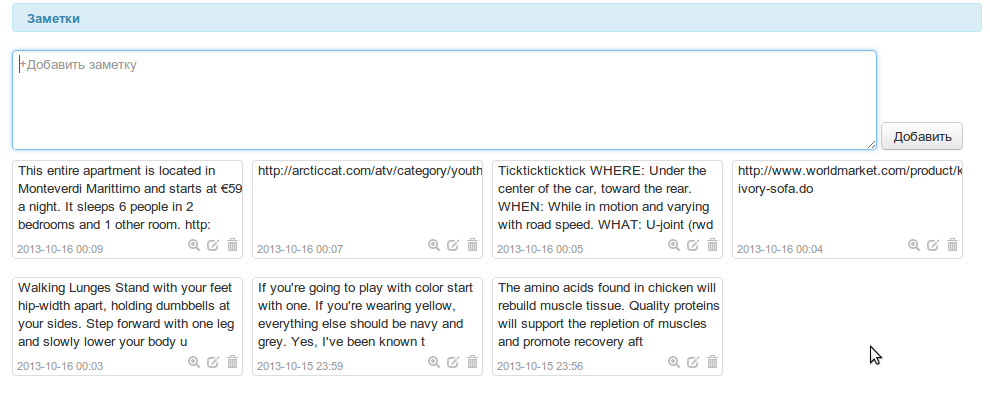PrettyTasks - personal task manager for everyone
We are glad to welcome you on Habré!
Good day to all habragers! We are pleased to present to our dear audience our service for managing personal tasks. We hope that you will love him as much as we do.
PrettyTasks - a task scheduling system “for yourself”
The main purpose of the service was to increase personal efficiency, by simplifying planning.
You can find it at prettytasks.com/ru
What for?
Oddly enough, GTD services, as well as task management services are really a lot. So why another one?
The answer lies in the fact that most services are not very convenient, and we decided to embody our vision. Our goal was to make the most convenient and simple service that will be understandable to everyone, and despite the simplicity, will increase personal efficiency.
')
The simplicity of the idea - the key to success
The idea is to plan tasks in the form of linear lists and tasks to be placed by day. You plan to do it today - you set a task for today, you plan for tomorrow, after, tomorrow.
Unfulfilled tasks do not pile up for the current day, but remain in the day on which the overdue ones were scheduled and available on the list.
Priorities were reduced to the maximum, there were only simple tasks and important ones. We recommend setting priorities by changing the order.
Planned tasks are tasks for the future;
Successful days can be celebrated, you can also comment on the days.
And no reminders
Service Description
The service provides the user with the following functions:
- Tasks
- Lists
- Notes
- Magazine
- Settings
Work with the service
In this section, we consider the features of working with the service.
Types of tasks
Routine task
Such a task is tied to the day, but not tied to time. Typically, the time of its execution is not essential.
Examples:
- On Saturday we go to the zoo.
- On Wednesday, sign up to the gym.
- Today to sign documents at the head.
Time bound task
Such a task is tied to both the day and the time. Doing it at the wrong time can lead to a failure of the task.
Examples:
- At 2 o'clock meeting.
- Go to the cinema at 20:00
- Date at 5:15
- Listen to the news at 5 pm
Tasks of this type operate on calendars.
Repetitive tasks
Such tasks are repeated with some frequency. They may or may not be time bound. A collection of repetitive tasks form a series.
Examples:
- Every Monday, Wednesday, Friday 19:00 - gym
- Fridays sauna with friends
- Every six months to do MOT.
Typing by priority and by duration
Priorities
Any task of the 4 types listed above can have priorities. We will prioritize normal and high.
Duration
Any task from “Normal task” or “Task with time reference” or “Recurring task” can be noted as continued. The meaning of this mark is that the task starts to appear ahead of time, so as not to miss. The date (and time) of such a task serves to indicate the deadline.
Examples:
- Write an article by November 20th.
- Prepare documents by 12:00 on the 17th
- Prepare a report by Monday
- Get ready for a weekend trip
Additional types
Challenge for the future
Such tasks are not tied to the day and time. They later turn into tasks of the “Normal Task” level or “Task with a time reference”, or specified.
Examples:
- Go to the Crimea
- Write an article about cruise
- Buy a second store
- Order business cards
Overdue tasks
These are the tasks of the first three types, for which the deadline has expired and which have not been marked as completed.
Completed tasks
Tasks marked “Completed”
That, in principle, is all about task types. They fully cover our planning needs.
Operations on tasks
Tasks are the heart of the system. The maximum attention was paid to the convenience of working with them.

Fig. 1. Task window
Work with tasks for the day
The main work with tasks occurs in some selected day. Most often these are the days today and tomorrow.
By selecting a specific day from the left menu, you can add tasks there.
Of course, tasks change their state.
Consider only the main ones:
- Mark a task as completed / unfulfilled (click on checkbox)
- Edit the task (click on the title or in the edit window)
- Change the priority (add to the task! Or in the edit window)
- Change the order of tasks (mouse dragging in the list)
- Move a task to another day (mouse dragging on another day)
- Tag task (add tag with # in the field)
- Move the task to another list (dragging to the list)
Task Lists
Tasks can be grouped by list using # tags. The list of lists can be viewed on the "Lists" page.

Fig. 2. List window
Notes
Notes allow you to save information of interest to you.

Fig. 3. The window for working with notes
What's next?
The service is actively developing, and we will be happy to hear your feedback and suggestions. Also, after your good impression, do not forget to tell your friends about the service.
Stay with us!
Source: https://habr.com/ru/post/201084/
All Articles